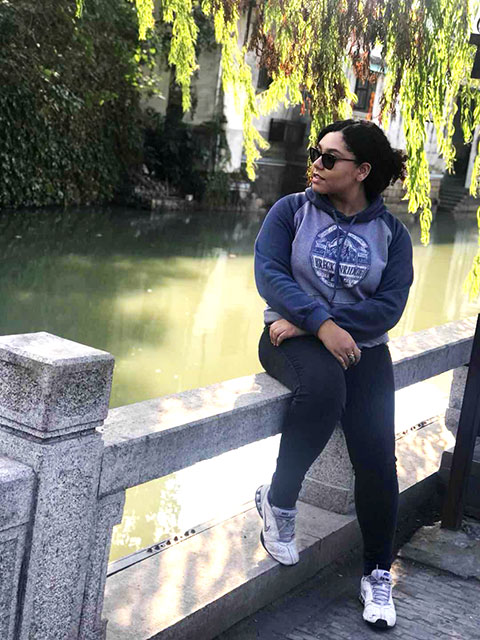Sieger was one of 15 undergraduates chosen from across the United States by the Embassy of the People’s Republic of China in Washington, D.C., for 2018-19 funding to study abroad. An art and English double-major, she is studying Chinese language and culture at Soochow University while also learning about local textile-making traditions that may be useful in a family-run business.
“I didn’t realize until after I’d already been chosen that there were only 15 spots offered,” Sieger wrote in an email from China. “I was flattered, a little bit shocked, but mostly excited that after an eight-month-long process, I had passed the final hurdle.”
She navigated the rigorous selection process, which involved applying to the embassy and to the university individually, with the help of FGCU Associate Art History Professor Megan McShane, who has taught and traveled extensively in China, and with the assistance of FGCU’s International Services Office.

“It’s one thing to get an American scholarship to study in China, but it’s a whole other order of business to be awarded the Chinese government’s U.S. Embassy scholarship,” says McShane, who taught Sieger in her “Chinese Contemporary Art History” course.
McShane commended her former pupil’s enthusiastic engagement in international lectures and events on campus as well as her commitment to student organizations and residence hall leadership. Sieger already has a strong background in computer-based graphic design, McShane says, and her experience in China will provide a foundation for the manufacturing and business side of producing textiles.
“In addition to being extraordinarily gifted academically and having a great work ethic, I could tell she was the type of person who could thrive when given an opportunity like this,” McShane says. “She’s such a deserving individual. To have someone like her representing our country and FGCU … if she’s the first American some people there meet and talk to? What a great first impression.”
On top of working as an FGCU Housing resident assistant for two years, Sieger has been active in the Honors Collegesince her sophomore year and served an ambassador for the Office of Multicultural and Leadership Development. Although she says she wasn’t particularly involved in high school activities, she gradually embraced opportunities at FGCU.
“All of these engagements facilitate interacting with others,” Sieger says. “It’s been important to me to learn about others while I have the environment to do so. I want to do my part to be a decent person, and I think understanding others — being empathetic and compassionate — is a worthwhile aspiration.”
With that mindset, she hopes to gain “a fresh worldview” as well as knowledge and understanding of textile production from her time abroad, she says. Having previously visited Spain, she’s not new to traveling in foreign countries. She’s learning Mandarin and hopes to have time to travel outside the urban setting of Suzhou, where Soochow University was established in 1900.
“I want to meet people different from myself,” Sieger says. “What I hope to gain from this experience is a broader understanding of our similarities as people. There have always been groups of ‘others’ in the U.S., labeled as such to push a narrative. Usually one of fear. I want to see for myself, with my own two eyes, what makes one person so different from the next. My short time here has already shown me we aren’t so different.”
Born in Miami and raised in Boynton Beach, Sieger seemingly was destined to pick up a common thread in her family background. Before leaving for China, she was training to follow in the footsteps of her paternal grandmother, whose companyrepresents multiple textile manufacturers around the country to clients in the south Florida hospitality industry. Her maternal grandmother was a seamstress who moved to the U.S. from Haiti and launched her own business, which provided the funds necessary to bring over the rest of her family. In her senior art project, Sieger paid tribute to the accomplished women in her lineage in a series of portraits.
“I feel that the best way to represent the U.S. (in China) is to be true to myself and my character as an individual,” Sieger says. “I think that as people get to know me, they will have questions related to my heritage and the broadly mixed cultures of the U.S. in general. My hope is that my international friends learn enough from my stories that they are open to experiencing America and all that it offers on their own terms, to form their own opinions without bias.”[/vc_column_text][vc_column_text]
ABOUT SUZHOU
Soochow University was Taylor Sieger’s preferred choice among the three Chinese universities she applied to, based on its programs and its setting in Suzhou in the Jiangsu province of eastern China.
“The landscape was an interesting blend of ancient structures against a backdrop of towering skyscrapers,” Sieger says. “The aesthetic of Suzhou is what caught my attention.”
A major commerce and cultural center with a metropolitan population over 10 million, Suzhou was founded in 514 BC, according to Encyclopedia Britannica. Silk and cotton textile industries have long been a mainstay of the local economy. The city near Shanghai also boasts more than 150 meticulously designed gardens dating as far back as the 11th century; they were collectively designated a UNESCO World Heritage site in 1997. The gardens and canals and Suzhou’s other cultural and historical sites make the area a popular destination for tourists and academics.
“It’s often described as ‘the Venice of the East,’” says FGCU Assistant Professor Megan McShane, who lectured in China on Western art history in 2006-07 as a Fulbright Luce Scholar. “Historically, every advisor to the emperor over the last several thousand years has had a home there. These were the greatest academics and achievers.”[/vc_column_text]
